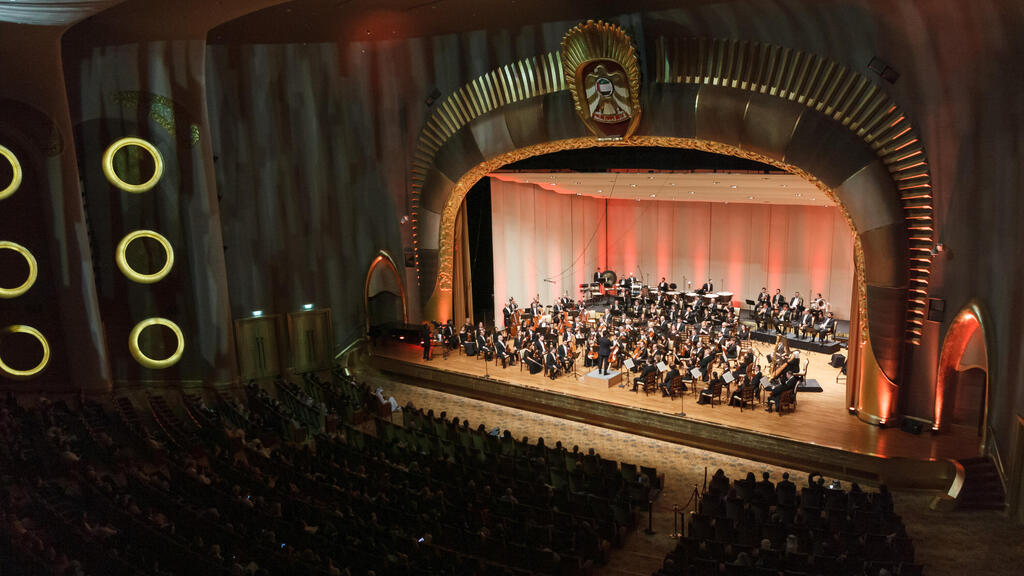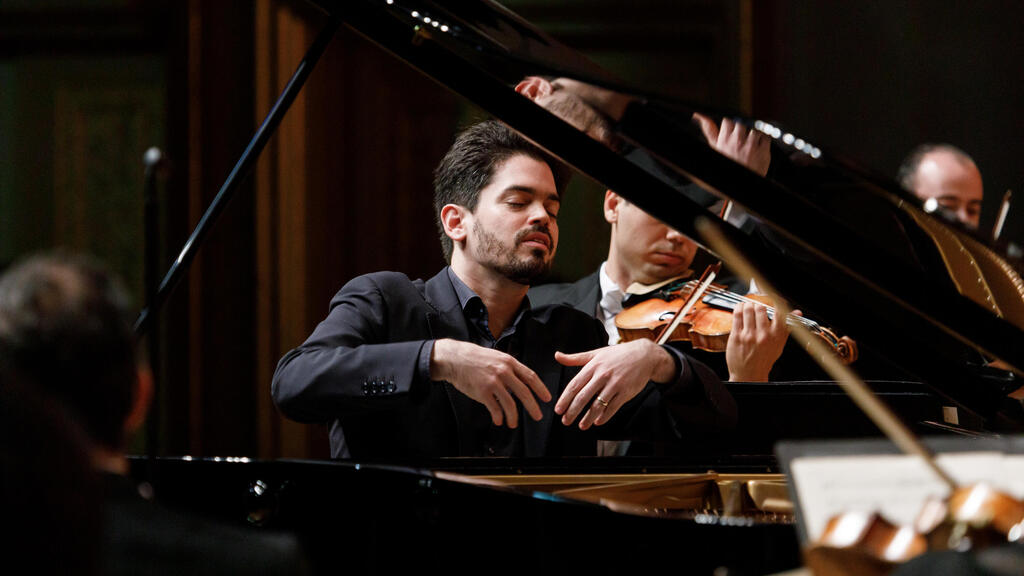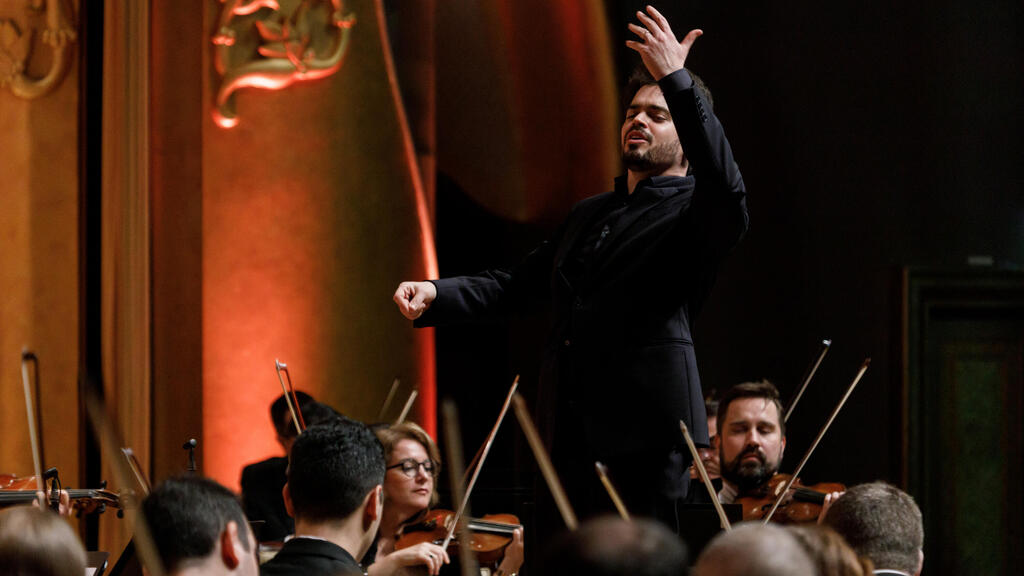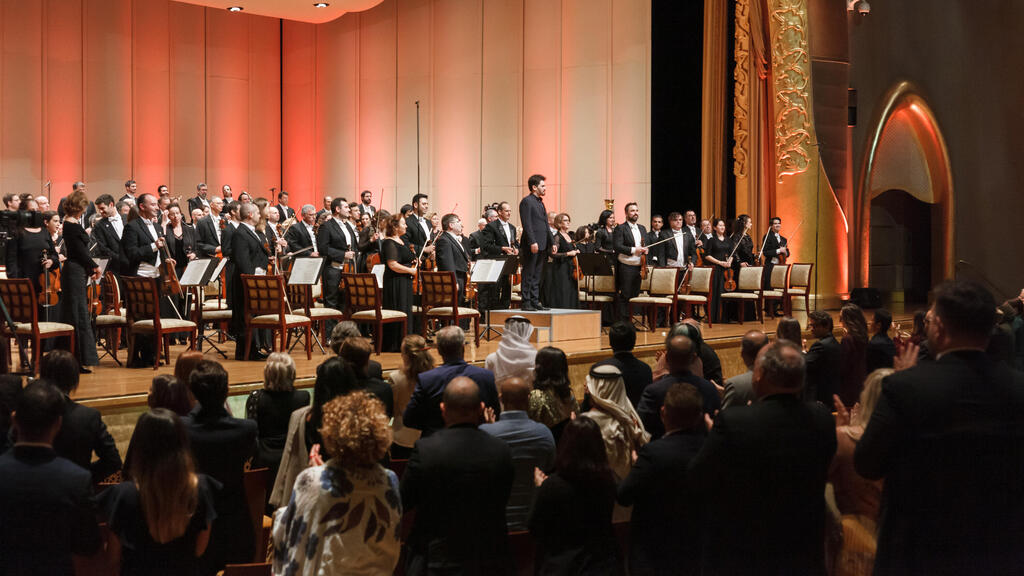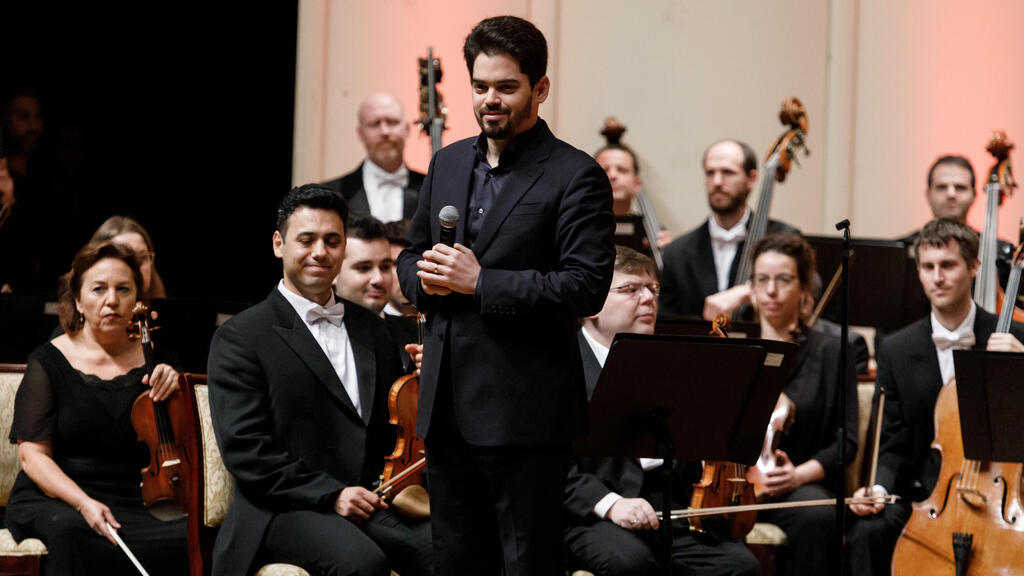How do you report a historic event without falling into the trap of pomposity and grandiosity? In journalistic terms, it is clear that the Israel Philharmonic Orchestra’s visit to Abu Dhabi is a cause for celebration: it is the first time that Israel's national orchestra has been officially invited to perform in an Arab country.
Israeli orchestras have appeared in a few Arab countries - the Andalusian Orchestra in Morocco, the Jerusalem Symphony Orchestra in Dubai. But this time it is an official trip, at the invitation of the Ministry of Culture of the United Arab Emirates and hosted by the UAE Minister of Foreign Affairs.
Israel Philharmonic Orchestra in Abu Dhabi
(Video: Israel Philharmonic Orchestra)
There is no doubt that the moment the orchestra started vigorously playing the national anthem of the United Emirates (Long live my Country) Aishi Bilady, immediately followed by the Israeli anthem, Hatikva, was a touching moment.
"The Israeli-Arab conflict has been going on for 100 years, with no solution at the moment," says Lahav Shani, the Philharmonic Orchestra’s musical director.
"Our performance in an Arab country is perhaps a small step on the way to what we all wish for - peace. It may be a small step, but it is certainly heartwarming. Music is a language of communication, a universal language that connects people, beyond words. And this connection that it produces is our humble contribution."
Distinguished Emiratis in white jalabiyas and honorable Emiratis in black abayas sat in the first rows of the magnificent Emirates Palace Auditorium, as did Sheikh Abdullah Bin Zayed - the Minister of Foreign Affairs of the United Arab Emirates (he is one of the sons of the founder of the UAE and the brother of the current president).
6 View gallery
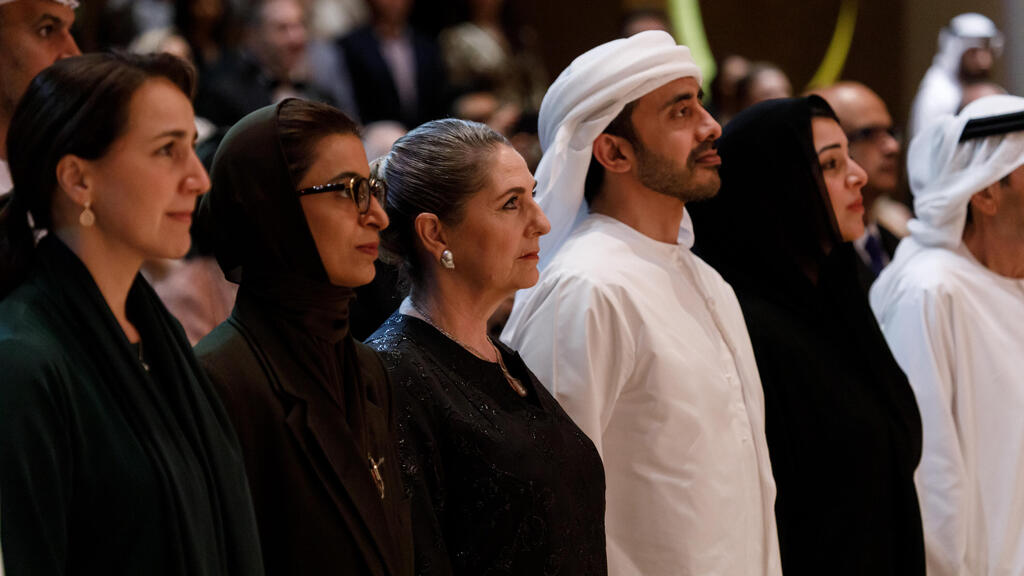

First lady Michal Herzog at the concert, with UAE's ministers of foreign affair and culture standing next to her on each side
(Photo: Shai Sakif)
Next to him sat Culture Minister Noura Al Kaabi: "This is an ongoing wonderful friendship," said Al Kaabi, "and I am sure that we will participate in many more cultural exchange events like this." About two months ago, in a Zoom conversation, Al Kaabi and Hili Tropper, outgoing Culture Minister, discussed cultural cooperation further to the Philharmonic concert, including theater and cinema collaborations.
Before the establishment of the State of Israel, the Philharmonic Orchestra held concert tours in Cairo and Alexandria, starting in 1937 and during the 1940s. The last time the orchestra played in an Arab country was in 1945 in Cairo, and it took 77 years for it to return.
It is clear that this event is first and foremost a political and diplomatic one. In this case, the Philharmonic Orchestra and its music are a means for establishing diplomatic rapprochement, in addition to economic and security cooperation.
However, unlike these types of cooperation, a concert can also move people and create a sense of closeness, and according to the applause the orchestra received at the end of the concert, the experience was considerable.
A journey abroad by such a large orchestra is a fascinating event in itself and there is no better way to be exposed to the guts of this special body. When the 100 or so individuals who make it up - of different ages - take to the stage, they become a single body following the same beat, a magical mechanism.
This week, during the World Cup final, I got a first peek into the insides of this mechanism: it turns out that a majority of Israeli Philharmonic musicians are fans of Messi and the Argentinian national team. Violinists and horn players, young and old, men and women - roared with joy with every Argentinian goal and booed when the French went on the attack.
Forget about serious and austere philharmonic musicians, this group leaped enthusiastically from armchairs like any average football fan from Buenos Aires.
Another illusion that was broken in this journey was the matter of age. It has not been for a long time an orchestra of older, respectable, and silver-haired men. The Philharmonic Orchestra today is more feminine than ever (at least a third of its members are women) and younger than ever (nearly half of its members are under 40 and many of them are under 30).
An entire generation of older musicians - many of them from the Russian immigrations of the previous century - retired in recent years, while an entire generation of talented young people stepped into their shoes.
These young people brought to the orchestra a very high professional standard - most of them have studied and played in international music centers – energy, curiosity, and openness. This means that they are also flexible enough to integrate the orchestra’s unique style.
Michal Mossek, who plays the French horn and is a member of the orchestra's management: "A good orchestra creates a unique identity. And although as musicians we have a cosmopolitan language, we still need a local dialect."
This "local dialect" of the orchestra was formulated during the time of Zubin Mehta, who served as its musical director for nearly 50 years. From the wind instruments such as horns and clarinets he demanded a dark sound. From the strings he demanded "a rich European sound ". And the entire orchestra has an aroma characteristic of the orchestra: a warm, condensed, rich sound like a dark red wine.
Another unique characteristic of the Israel Philharmonic is its flexibility. "This is perhaps our most Israeli characteristic. We are not rigid, we are open to refreshing our musical perspectives and to changing habits, and flexible enough to adapt to the unique styles of new conductors," adds Mossek.
The bottom line is that the renewing Philharmonic is an up-to-date, alert and better than ever orchestra. The interesting thing is that the change of generations did not affect its characteristic sound.
How does it happen? First of all, because the changes happened gradually; and above all because a new player learns the "ways of the orchestra" when he huddles under the wings of the older players in the same group of instruments.
He hears their sound, reads the special accents, the language, the tone, and thus assimilates the sound identity and the "spirit of the orchestra". This is not just talk. Veterans of the orchestra like to say that Daniel Barenboim agreed to be appointed the artistic director of the Berlin State Orchestra, after hearing "the beloved sound of the Israel Philharmonic" at an audition with them. A sound that was so familiar to him and loved since his youth.
Bernbaum indirectly influences the Philharmonic until today, as many of the graduates of the orchestra he founded - the West-Eastern Divan Orchestra – currently play in the Philharmonic.
"Divan was a perfect school for orchestra players," says Sharon Cohen-Milonsky, a member of the first violin section: "Divan was challenging, demanding, it taught us discipline and work habits, it broadens musical and cultural horizons, and has a vision of music devoid of national identity that seeks to connect people directly. It’s a wonderful school."
Daniel Barenboim was also a kind of mentor to 34-year-old Lahav Shani who two years ago stepped into the great Zubin Mehta’s shoes and was appointed as the orchestra’s musical director. Shani knows the orchestra well and the orchestra knows him.
He appeared with them for the first time as a solo pianist-vocalist, at the age of 17. And in 2013, when he was 24 years old, he was called to replace the conductor Kurt Mazor when he was ill. "Are you available?" Avi Shoshani, the orchestra’s director-general asked him at the time. "Yes," replied Shani, "but with such short notice, I can only conduct Mahler."
There is a reason for this. A while earlier Shani won first place in the super-prestigious Mahler conducting competition, in Bamberg, Germany. Before the competition, he delved into Mahler's first symphony. Shoshani agreed, and Lahav Shani conducted an unforgettable concert. Unfortunately, I was not there, but friends said that the orchestra responded to Shani with unusual enthusiasm and precision.
This is also the symphony that Lahav Shani and the orchestra performed at the Emirates Palace in Abu Dhabi. This symphony, which Mahler composed in 1888, is a masterpiece. The music is very generous and accessible, and it penetrates the heart. We won't go into detail, but Mahler introduced innovations into it.
For example, combining materials from folk songs in a symphonic arrangement. Previous composers have also quoted song themes, minuets for example. But with Mahler, these quotations became key components of the entire orchestration. In the third movement, for example, there is a magnificent double bass solo based on the well-known French folk song Frère Jacques ("Our Brother Jacob"), and of particular note is Mahler's use of Jewish klezmer music.
How well does the diverse audience in Abu Dhabi know this music and the orchestra’s special affinity to it? I don’t know. But the audience's connection to the music was clear and the applause was particularly loud. A delightful final chord for a short and fascinating journey.




